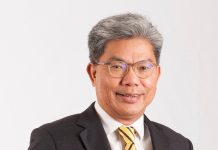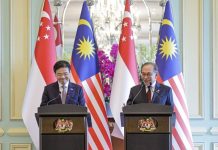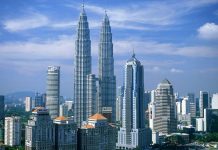- Malaysia-China Total Trade At US$96.3 bln In 2017
- Retail investors in Malaysia, Singapore and Thailand to have wider access to fund managers across the three countries
- Malaysia’s Pride: Major Move to Secure Regional Cybersecurity Economy Growth
- Malaysia Continues to Record Strong Labour Productivity Growth
- IATA: 1 Bln Passengers On Jet Fuel, SAF Mix Flights By 2025
- Singapore PM to Reshuffle Cabinet to Give Younger Ministers More Exposure
- Qualtrics Strengthens Asia Pacific Presence
Malaysia-China Total Trade At US$96.3 bln In 2017
Malaysian Prime Minister Datuk Seri Najib Tun Razak said total bilateral trade between Malaysia and China last year remained strong at US$96.3 billion in spite of the uncertainty in the global economy. He said among the milestones of the strong relationship are the successful establishment of the China-Malaysia Qinzhou Industrial Park and the Malaysia-China Kuantan Industrial Park between 2012 and 2013. “The Qinzhou start-up area of 7.87 sq km is almost completed and has attracted 90 major strategic investors so far who are investing a total of 90 billion renminbi (RMB) in the park. “In spite of the higher participation rate of the Chinese investors, 49 per cent of the Master Development share is held by a Malaysian consortium, which is jointly owned by Rimbunan Hijau Group and SP Setia Bhd,” he said in Kuala Lumpur. On the Malaysia-China Kuantan Industrial Park, Datuk Seri Najib said one of the first entrants, Alliance Steel (M) Sdn Bhd, would start operations by the second quarter of this year, with an investment of RM5 billion and would provide 4,000 new jobs.
Retail investors in Malaysia, Singapore and Thailand to have wider access to fund managers across the three countries
The Securities Commission Malaysia, the Monetary Authority of Singapore, and the Securities and Exchange Commission of Thailand have signed a Memorandum of Understanding to enhance the ASEAN Collective Investment Schemes (CIS) Framework. The Framework enables fund managers operating in one jurisdiction to offer funds constituted and approved in that jurisdiction to retail investors in the other two jurisdictions under a streamlined authorisation process. The revised Framework, which incorporates feedback from extensive industry consultations, seeks to promote more cross-border offerings of ASEAN funds and allow fund managers to offer a broader range of fund products to investors in the region. The revised Framework took effect on 23 February 2018. The key enhancements to the Framework will:
• enable a wider range of fund managers to participate in the framework by lowering qualifying criteria to US$350 million assets under management from the US$500 million;
• shorten the time-to-market for the launch of funds, as the signatories have committed to reviewing within 21 calendar days a complete application from fund managers for the authorisation of a fund; and
• give participating fund managers more flexibility to delegate the investment management of a fund by increasing from 20% to 100% the proportion of the fund’s assets that can be sub-managed by a manager that is not regulated by a signatory.
Malaysia’s Pride: Major Move to Secure Regional Cybersecurity Economy Growth
Malaysia Digital Economy Corporation (MDEC), the lead agency for the Digital Economy, in a collaboration with the UK’s Protection Group International (PGI), and the Asia Pacific University of Technology & Innovation (APU), and security solutions provider Tecforte, has a new move to further protect and accelerate Malaysia’s cybersecurity ecosystem with two strategic initiatives under the MDEC Talent program called Platform for Real Industry Driven Project Exchange (PRIDE). During the official document exchange ceremony, MDEC Chief Executive Officer Datuk Yasmin Mahmood explained, “ASEAN’s digital economy has the potential to add US$1 Trillion to Gross Domestic Product (GDP) over the next 10 years. However, the increasing wave of cyber threats and risks could impede trust and resilience in the digital economy and prevent the region from realising its full digital potential. Malaysia has also seen strong economic growth in recent years and is determined to continue this trend to achieve the Government’s vision of becoming a high-income nation. More importantly, Malaysia’s own digital economy has been growing by leaps and bounds, contributing some 17.8% to the country’s Gross Domestic Product in 2015, just shy of the18.2% target previously set by the Government.” Datuk Yasmin cited a December 2017 LinkedIn report on cybersecurity talent in Malaysia, which showed that 21% have up to just 4 years of experience. “While it is encouraging that the study showed 21% of Malaysia’s cyberSecurity workforce are women (compared to 11% in the US), the overall situation is cause for alarm as the ‘ funnel’ of new talent is too small and not enough to sustain and support growing demand of our Digital Economy. Hence, through the facilitation MDEC PRIDE Programme, we will increase the ‘industry-readiness’ of our graduates with ‘ ELITE’ – the Educational Outreach initiative from cybersecurity industry provider, TecForte – which will feature a live learning Security Information Event Management (SIEM) platform where students will be introduced to hands-on cybersecurity operations. Students will also be exposed to real-time event analytics, global threat intelligence, and incidents handling framework within the campus environment.”
Malaysia Continues to Record Strong Labour Productivity Growth
Malaysia’s labour productivity grew 3.6% to RM85, 031 in Q4 2017 following the 4.1% growth (RM82,433) in Q3 2017. For the year as a whole, the country’s labour productivity growth stood at 3.6% (RM81,039) compared to RM78,244 in 2016. This is a continuous improvement following the growth of 3.5% in labour productivity recorded in 2016. In the period of 2010-2016, labour productivity grew by an average of 2.2%. In Q4 2017, across all economic sectors, agriculture recorded the highest labour productivity growth of 4.8%, The 11th Malaysia Plan (2016-2020) has set a target of 3.7% labour productivity growth. To date, Malaysia has achieved 87.8% of the targeted level of RM92,300 labour productivity by 2020. Minister of International Trade and Industry, Dato Seri Mustapa Mohamad said Malaysia could expect continuous improvement in labour productivity, especially with the implementation of the Malaysian Productivity Blueprint last year which aims to shift the approach to productivity from the primarily Government driven initiatives at the national level to targeted action across the public sector, industry players and individual enterprises. Dato Seri Mustapa pointed out that despite the steady productivity growth over the last few years, it is still a work in progress and more needed to be done to boost productivity which will be the key for Malaysia to attain the high income nation status by 2020.

IATA: 1 Bln Passengers On Jet Fuel, SAF Mix Flights By 2025
The International Air Transport Association (IATA) is targeting one billion passengers to fly on flights powered by a mix of jet fuel and sustainable aviation fuel (SAF) by 2025. IATA said this aspiration was identified on the tenth anniversary of the first flight to blend sustainable aviation fuel and ordinary jet fuel. “On February 24, 2008, a Virgin Atlantic Boeing 747 flew from London to Amsterdam with sustainable aviation fuel in one of its engines. The flight demonstrated the viability of drop-in biofuels, which can be blended with traditional jet fuel, using existing airport infrastructure. “A flight completely powered by sustainable fuel has the potential to reduce the carbon emissions of that flight by up to 80 per cent,” it said. IATA Director General and Chief Executive Officer, Alexandre de Juniac said the target would not be easy and the association needs governments to set a framework to incentivise production of SAF and ensure it is as attractive to produce as automotive biofuels.
Singapore PM to Reshuffle Cabinet to Give Younger Ministers More Exposure
Singapore Prime Minister Lee Hsien Loong said he would reshuffle his cabinet during Parliament’s mid-term break in a move aimed at giving younger ministers more exposure and responsibility. The Parliament is expected to take a break next month after the Budget debate. Last month, Prime Minister Lee said that the Cabinet reshuffle will be “a significant step in exposing and building the new team of leaders”, although he does not plan to appoint new deputy prime ministers. Mr Lee said earlier that the Government’s agenda will “bear the imprint” of the fourth-generation leaders, who are taking on greater responsibilities and putting forth their ideas for Singapore.
Qualtrics Strengthens Asia Pacific Presence
Qualtrics, the leader in research and experience management is growing its Asia Pacific presence with the opening of a Japan office, based in Tokyo. The establishment of the Japan office will allow Qualtrics to address the important Japanese market and provide high quality, local service to its Japanese clients. Leading Qualtrics in the Japan region is Satoru Kumashiro, who brings 19 years of experience in the technology industry. Kumashiro will establish an initial team of eleven employees in 2018. He will focus on scaling the Qualtrics organisation in Japan to include client success, implementation, support, marketing, and technical functions in order to support the rapidly expanding customer base. Qualtrics plans to provide a full range of experience management services and aims to build the local team to more than fifty employees in support of the customer base, which is expected to grow to more than three-hundred customers within the next three years.
























